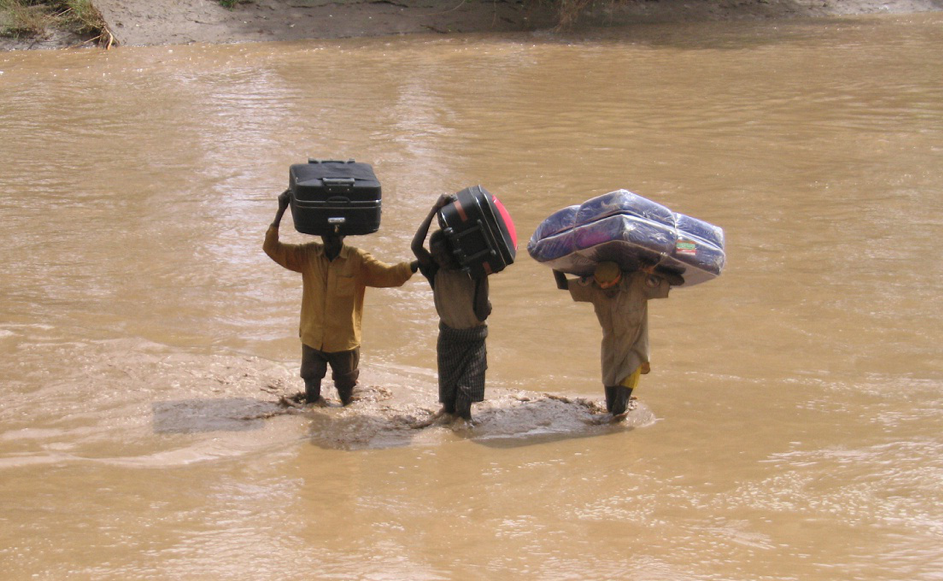Global Warming in Africa: Out of the Frying Pan and Into the Fire
Global Warming in Africa: Out of the Frying Pan and Into the Fire
Impacts of Climate Change in the African Continent
By Loic Tchinda
Living in Cameroon, a country at the frontline of climate change, I see people suffering greatly from the impacts of climate change. Some areas are struggling with its effects, however, a town is taking action to make a difference.

A main urban centre in the Littoral region of Cameroon, Douala is a gateway into the African continent. The town is one of the biggest urban agglomerations in sub-Saharan Africa and perhaps the most important economic hotspot in Central Africa.
It’s 11:00 am and the heat quickly becomes suffocating at the Central Market in the New Bell neighbourhood. A group of women told me how they adapt to temperatures that can reach up to 38 °C during dry seasons. Constant re-hydration and fanning are the best they can do when seated under their umbrellas. Some, make a living out of this terrible heat: the young people who go about selling freshwater.
Fact: 97% of scientists agree that changes in our climate are caused by humans. Evidence shows that the change in temperature is affecting our health, livelihoods, food productivity, water availability and national security.
In the case of Africa, we do not have significant sources of greenhouse gas emissions. It only accounts for 2 to 3 percent of the world’s CO2 emissions from energy and industrial sources. But despite this, our continent is particularly vulnerable because of damaging climate risks including extreme droughts, flooding and storms.
According to the Climate Change Vulnerability Index for 2017, seven of the ten countries most at risk from climate change are in Africa.
The African continent is witnessing a decrease in rainfall over large parts of the Sahel and Southern Africa, and an increase in most parts of Central Africa. Temperatures are exploding. The continent is witnessing very hot dry seasons and many rainy days during the rainy season.
For African states, adapting to these harsh climatic conditions is an urgent necessity. To do so, we must answer these questions:
- What climate-related losses could these economies sustain over the coming decades? How much can be averted and through what measures?
- Which investments will be required to finance them?
- Will the benefits outweigh the costs?
Prior to taking the Introductory e-course on Climate Change on UN CC:e-Learn platform in November 2017, I had no clue about any of this. Upon taking the course, this is what I learned:
Africa is susceptible to constant changes in weather patterns
Droughts: Frequent and severe in many countries of Sub-Saharan Africa like Angola and Burundi, droughts have a devastating impact on people and the economy. The extreme vulnerability to rainfall in the arid and semiarid areas of the continent and the poor capacity of most African soils to retain moisture results in periods of drought.

Flooding: it’s the most prevalent disaster in Northern Africa, the second most common in East, South and Central Africa, and the third most common in West Africa (AWDR, 2006).
In Northern Africa, the disastrous flood in northern Algeria resulted in about 800 deaths and economic loss of about $400 million. (AWDR, 2006).

The quality and supply of water is becoming scarcer
Some of the effects of climate change on water resources in Africa include: flooding, drought, change in the distribution of rainfall, the drying-up of rivers, and the receding of bodies of water.
It might come as no surprise that water scarcity will increase, and an expected 250 million people will not have a sufficient water supply by 2020.
Water scarcity also affects the most vulnerable people in society (women, children and the elderly). For example, women labourers often experience additional duties as caregivers after extreme weather events.
Food insecurity is rising
Its estimated that that revenues from crops will drop by as much as 90% in certain parts of the continent by 2100. Across the African continent, the temperature is rising, and the landscape is changing. Droughts, heat stress, and flooding have led to a reduction in crop yields and livestock productivity, according to the World Bank.
Our health is taking a toll
Climate-sensitive diseases and health impacts can be higher in developing countries that have minimal resources to treat and prevent illness. Examples of climate-related health impacts include:
- Frequent and severe heat stress linked to sustained increases in temperature.
- Impacts of climate change on agriculture and other food systems increases rates of malnutrition and contributes to poverty.
- The spread of Malaria may increase in areas projected to receive more precipitation and flooding. Children and the elderly face are particularly at risk to contract infectious diseases, including malaria. (IPCC, 2014)
Housing and shelter crisis
Severe flooding and intense droughts have led to the destruction of many homes, shelters and villages in Cameroon and across Africa.
Extreme events displace large amounts of people, especially those who are unable to respond and rebuild after disasters, due to lack of resources.

Even the national security of countries is at risk
Climate change impacts have the potential to exacerbate national security issues and increase the number of international conflicts. Conflicts often occur over the use of already limited natural resources, fertile ground and water. Access to consistent and dependable sources of water is greatly valued in many African regions. However, changes in the timing and intensity of rainfall have threatened water availability and are causing conflicts over these limited resources (IPCC, 2014).
Thanks to UN CC:e-Learn’s Introductory e-course on Climate Change course, I’ve become more aware of the climate change implications. For example, a couple of friends, and I have set up WEM’AFRIKA, a small NGO that encourages youth to participate and become active citizens of our country, Cameroon.
About UN CC:Learn
UN CC:Learn is a partnership of more than 30 multilateral organizations supporting countries to design and implement systematic, recurrent and results-oriented climate change learning. Through its engagement at the national and global levels, UN CC:Learn contributes to the implementation of climate change training, education and public awareness-raising.